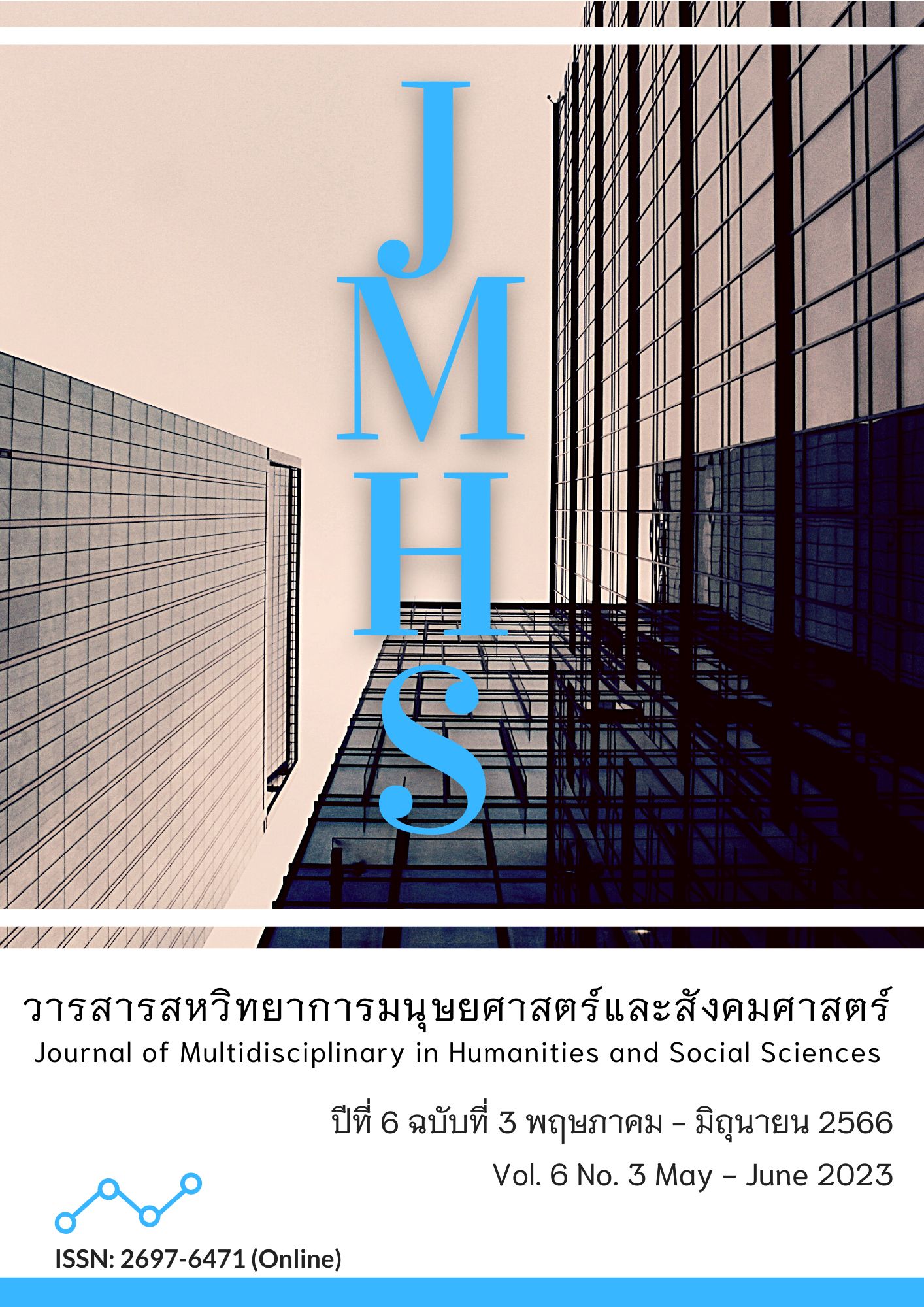Phenomenon-based Learning Management with Gamification to Promote Scientific Literacy on Natural Disasters on the Surface of the Earth for Grade 8 Students
Main Article Content
Abstract
This article aimed to (1) study the phenomenon-based learning management approach with gamification and to promote scientific literacy on natural disasters on the surface of the earth, and (2) study the promotion of scientific literacy with learning management using phenomena as a base with gamification. The research model was action research in the classroom. There were 3 action cycles as a research framework. The sample consisted of 36 8th grade students using purposive sampling. There were 4 types of research tools: 1) a learning management plan; 2) a reflection form; 3) a learning activity sheet; and 4) a scientific literacy assessment. The data were analyzed by content analysis and percentage statistics, and the development of science literacy levels was analyzed by scoring and grading according to the PISA 2015 assessment framework.
The research results were as follows: The phenomenon-based learning approach combined with gamification consists of 5 steps, emphasizing phenomena that are close to or encountered in daily life. Encourage students to express their opinions. Credible references are searched for. And rewarding students makes them more interested. The results of promoting science literacy revealed that the level of science literacy of students after learning was 2 levels higher than before learning at level 1b, and the students showed the greatest improvement in their competencies in assessing and designing scientific literacy acquisition processes.
The findings of this research are phenomena-based learning management with gamification. It can promote students' scientific intelligence. can be linked to real-life problems, and students who dare to express their own opinions enjoy doing more activities.
Article Details

This work is licensed under a Creative Commons Attribution-NonCommercial-NoDerivatives 4.0 International License.
Views and opinions appearing in the Journal it is the responsibility of the author of the article, and does not constitute the view and responsibility of the editorial team.
References
กระทรวงศึกษาธิการ. (2560). ตัวชี้วัดและสาระการเรียนรู้แกนกลาง กลุ่มสาระการเรียนรู้วิทยาศาสตร์ (ฉบับปรับปรุง พ.ศ. 2560) ตามหลักสูตรแกนกลางการศึกษาขั้นพื้นฐาน พุทธศักราช 2551. กรุงเทพฯ: ชุมชนสหกรณ์การเกษตรแห่งประเทศไทย.
กฤษณพงศ์ เลิศบำรุงชัย. (2017). เกมิฟิเคชั่น (Gamification) โลกแห่งการเรียนรู้ที่ขับเคลื่อนด้วยเกม. Touchpoint. สืบค้นจาก https://touchpoint.in.th/gamification/.
โครงการ PISA ประเทศไทย สถาบันส่งเสริมการสอนวิทยาศาสตร์และเทคโนโลยี. (2558). ผลการประเมิน PISA 2015 วิทยาศาสตร์ การอ่าน และคณิตศาสตร์ ความเป็นเลิศและความเท่าเทียมทางการศึกษา. กรุงเทพฯ. ซัคเซสพับลิเคชั่น.
จีรนันท์ ครุธาโรจน์, รัฐพล ประดับเวทย์ และ นฤมล ศิระวงษ์. (2564). การพัฒนาชุดกิจกรรมการเรียนรู้ที่ใช้กลวิธีการเดาความหมายจากบริบทร่วมกับเกมมิฟิเคชันเพื่อส่งเสริมความสามารถในการอ่านภาษาอังกฤษ. วารสารศึกษาศาสตร์ มหาวิทยาลัยมหาสารคาม, 15(3), 47-630. สืบค้นจาก http://edu.msu.ac.th/journal/home/journal_file/785.pdf
ฉัตรพงศ์ ชูแสงนิล. (2561). เกมมิฟิเคชั่นเรียนเล่นให้เป็นเกม. คลังความรู้ SciMath. สืบค้นจาก https://www.scimath.org/article-technology/item/8669-2018-09-11-08-06-48.
ชนัตถ์ พูนเดช. (2559). แนวทางการจัดการเรียนรู้ด้วยแนวคิดเกมมิฟิเคชั่น. วารสารศึกษาศาสตร์ มหาวิทยาลัยนเรศวร, 18(3), 331-339. สืบค้นจาก https://so06.tci-thaijo.org/index.php/edujournal_nu/ article/view/66651
ตะวัน ไชยวรรณ และ กุลธิดา นุกูลธรรม. (2564). การจัดการเรียนรู้โดยใช้ปรากฏการณ์เป็นฐาน : การเรียนรู้แบบบูรณาการ เพื่อส่งเสริมความรู้ของผู้เรียนในโลกแห่งความจริง. วารสารบัณฑิตศึกษา มหาวิทยาลัยราชภัฏวไลยอลงกรณ์ ในพระบรมราชูปถัมภ์, 15(2), 251-263. สืบค้นจาก https://so02.tci-thaijo.org/index.php/JournalGradVRU/article/view/246642
พิมพลอย ตามตระกูล. (2565). การพัฒนาความฉลาดรู้ด้านวิทยาศาสตร์ เรื่อง กรด-เบส ด้วยการจัดการเรียนรู้ แบบใช้บริบทเป็นฐานร่วมกับการใช้เทคโนโลยี สำหรับนักเรียนชั้นมัธยมศึกษาปีที่ 5. วารสารมนุษยศาสตร์และสังคมศาสตร์ มหาวิทยาลัยนครพนม, 12(1), 291-305. สืบค้นจาก https://so03.tci-thaijo.org/index.php/npuj/article/view/252423
เรวณี ชัยเชาวรัตน์. (2562). การเรียนรู้โดยใช้ปรากฏการณ์เป็นฐาน. Thepotential. สืบค้นจาก https://thepotential.org/knowledge/phenomenon-based-learning/.
สิรินภา กิจเกื้อกูล. (2557). การจัดการเรียนวิทยาศาสตร์ทิศทางสำหรับครูสตวรรษที่ 21. เพชรบูรณ์: จุลดิสการพิมพ์.
สำนักงานคณะกรรมการการศึกษาขั้นพื้นฐาน. (2562). รายงานการอบรมหลักสูตร Science Education for Science and Mathematically Gifted Learner The Normal Lyceum of Helsinki. สืบค้นจาก https://www.obec.go.th/wp-content/uploads/2019/06/Finland-สวก.pdfdi
สำนักงานเลขาธิการสภาการศึกษา. (2560). แผนการศึกษาแห่งชาติ พ.ศ. 2560 – 2579. กรุงเทพฯ. พริกหวานกราฟฟิค.
สุชานันท์ วรวัฒนานนท์ และ สกนธ์ชัย ชะนูนันท์. (2566). การจัดการเรียนรู้แบบปรากฏการณ์เป็นฐานเพื่อพัฒนาทักษะการคิดอย่างมีวิจารณญาณและการแก้ปัญหา เรื่องปรากฏการณ์ของโลกและภัยธรรมชาติของนักเรียนชั้นประถมศึกษาปีที่ 6. Journal of Roi Kaensarn Academi, 8(1), 136-149. สืบค้นจาก https://so02.tci-thaijo.org/index.php/JRKSA/article/view/257433
อรพรรณ บุตรกตัญญู. (2561). การเรียนรู้โดยใช้ปรากฏการณ์เป็นฐานเพื่อการสร้างมุมมองแบบองค์รวมและการเข้าถึงโลกแห่งความเป็นจริงของผู้เรียน. วารสารครุศาสตร์ จุฬาลงกรณ์มหาวิทยาลัย, 46(2), 348-365. สืบค้นจาก https://so02.tci-thaijo.org/index.php/EDUCU/ article/view/131909
Kim, S. (2013). Effects of the Gamified Class in Engineering Education Environments. Journal of Convergence Information Technology, 8(13), 253.
Islakhiyah, K., Sutopo, S. & Yulianti, L. (2018). Scientific Explanation of Light through Phenomenon-based Learning on Junior High School Student. Advances inSocial Science, Education and Humanities Research, 218, 173-185. https://doi.org/10.2991/icomse-17.2018.31


